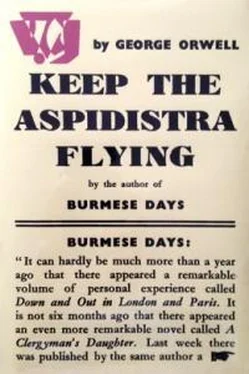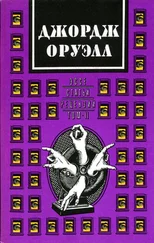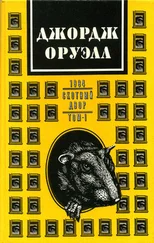'This writing business! What b—s it all is! Sitting in a corner torturing a nerve which won't even respond any longer. And who wants poetry nowadays? Training performing fleas would be more useful by comparison.'
'Still, you oughtn't to let yourself be discouraged. After all, you do produce something, which is more than one can say for a lot of poets nowadays. There was Mice, for instance.'
'Oh, Mice! It makes me spew to think of it.'
He thought with loathing of that sneaky little foolscap octavo. Those forty or fifty drab, dead little poems, each like a little abortion in its labelled jar. 'Exceptional promise', The Times Lit. Supp. had said. A hundred and fifty–three copies sold and the rest remaindered. He had one of those movements of contempt and even horror which every artist has at times when he thinks of his own work.
'It's dead,' he said. 'Dead as a blasted foetus in a bottle.'
'Oh, well, I suppose that happens to most books. You can't expect an enormous sale for poetry nowadays. There's too much competition.'
'I didn't mean that. I meant the poems themselves are dead. There's no life in them. Everything I write is like that. Lifeless, gutless. Not necessarily ugly or vulgar; but dead—just dead.' The word 'dead' re–echoed in his mind, setting up its own train of thought. He added: 'My poems are dead because I'm dead. You're dead. We're all dead. Dead people in a dead world.'
Ravelston murmured agreement, with a curious air of guilt. And now they were off upon their favourite subject—Gordon's favourite subject, anyway; the futility, the bloodiness, the deathliness of modern life. They never met without talking for at least half an hour in this vein. But it always made Ravelston feel rather uncomfortable. In a way, of course, he knew—it was precisely this that Antichrist existed to point out—that life under a decaying capitalism is deathly and meaningless. But this knowledge was only theoretical. You can't really feel that kind of thing when your income is eight hundred a year. Most of the time, when he wasn't thinking of coal–miners, Chinese junk–coolies, and the unemployed in Middlesbrough, he felt that life was pretty good fun. Moreover, he had the naive belief that in a little while Socialism is going to put things right. Gordon always seemed to him to exaggerate. So there was subtle disagreement between them, which Ravelston was too good–mannered to press home.
But with Gordon it was different. Gordon's income was two pounds a week. Therefore the hatred of modern life, the desire to see our money–civilization blown to hell by bombs, was a thing he genuinely felt. They were walking southward, down a darkish, meanly decent residential street with a few shuttered shops. From a hoarding on the blank end of a house the yard–wide face of Corner Table simpered, pallid in the lamplight. Gordon caught a glimpse of a withering aspidistra in a lower window. London! Mile after mile of mean lonely houses, let off in flats and single rooms; not homes, not communities, just clusters of meaningless lives drifting in a sort of drowsy chaos to the grave! He saw men as corpses walking. The thought that he was merely objectifying his own inner misery hardly troubled him. His mind went back to Wednesday afternoon, when he had desired to hear the enemy aeroplanes zooming over London. He caught Ravelston's arm and paused to gesticulate at the Corner Table poster.
'Look at that bloody thing up there! Look at it, just look at it! Doesn't it make you spew?'
'It's aesthetically offensive, I grant. But I don't see that it matters very greatly.'
'Of course it matters—having the town plastered with things like that.'
'Oh, well, it's merely a temporary phenomenon. Capitalism in its last phase. I doubt whether it's worth worrying about.'
'But there's more in it than that. Just look at that fellow's face gaping down at us! You can see our whole civilization written there. The imbecility, the emptiness, the desolation! You can't look at it without thinking of French letters and machine guns. Do you know that the other day I was actually wishing war would break out? I was longing for it—praying for it, almost.'
'Of course, the trouble is, you see, that about half the young men in Europe are wishing the same thing.'
'Let's hope they are. Then perhaps it'll happen.'
'My dear old chap, no! Once is enough, surely.'
Gordon walked on, fretfully. 'This life we live nowadays! It's not life, it's stagnation, death–in–life. Look at all these bloody houses, and the meaningless people inside them! Sometimes I think we're all corpses. Just rotting upright.'
'But where you make your mistake, don't you see, is in talking as if all this was incurable. This is only something that's got to happen before the proletariat take over.'
'Oh, Socialism! Don't talk to me about Socialism.'
'You ought to read Marx, Gordon, you really ought. Then you'd realize that this is only a phase. It can't go on for ever.'
'Can't it? It FEELS as if it was going on for ever.'
'It's merely that we're at a bad moment. We've got to die before we can be reborn, if you take my meaning.'
'We're dying right enough. I don't see much signs of our being reborn.'
Ravelston rubbed his nose. 'Oh, well, we must have faith, I suppose. And hope.'
'We must have money you mean,' said Gordon gloomily.
'Money?'
'It's the price of optimism. Give me five quid a week and I'D be a Socialist, I dare say.'
Ravelston looked away, discomforted. This money–business! Everywhere it came up against you! Gordon wished he had not said it. Money is the one thing you must never mention when you are with people richer than yourself. Or if you do, then it must be money in the abstract, money with a big 'M', not the actual concrete money that's in your pocket and isn't in mine. But the accursed subject drew him like a magnet. Sooner or later, especially when he had a few drinks inside him, he invariably began talking with self–pitiful detail about the bloodiness of life on two quid a week. Sometimes, from sheer nervous impulse to say the wrong thing, he would come out with some squalid confession—as, for instance, that he had been without tobacco for two days, or that his underclothes were in holes and his overcoat up the spout. But nothing of that sort should happen tonight, he resolved. They veered swiftly away from the subject of money and began talking in a more general way about Socialism. Ravelston had been trying for years to convert Gordon to Socialism, without even succeeding in interesting him in it. Presently they passed a low–looking pub on a corner in a side–street. A sour cloud of beer seemed to hang about it. The smell revolted Ravelston. He would have quickened his pace to get away from it. But Gordon paused, his nostrils tickled.
'Christ! I could do with a drink,' he said.
'So could I,' said Ravelston gallantly.
Gordon shoved open the door of the public bar, Ravelston following. Ravelston persuaded himself that he was fond of pubs, especially low–class pubs. Pubs are genuinely proletarian. In a pub you can meet the working class on equal terms—or that's the theory, anyway. But in practice Ravelston never went into a pub unless he was with somebody like Gordon, and he always felt like a fish out of water when he got there. A foul yet coldish air enveloped them. It was a filthy, smoky room, low–ceilinged, with a sawdusted floor and plain deal tables ringed by generations of beer–pots. In one corner four monstrous women with breasts the size of melons were sitting drinking porter and talking with bitter intensity about someone called Mrs Croop. The landlady, a tall grim woman with a black fringe, looking like the madame of a brothel, stood behind the bar, her powerful forearms folded, watching a game of darts which was going on between four labourers and a postman. You had to duck under the darts as you crossed the room, there was a moment's hush and people glanced inquisitively at Ravelston. He was so obviously a gentleman. They didn't see his type very often in the public bar.
Читать дальше








